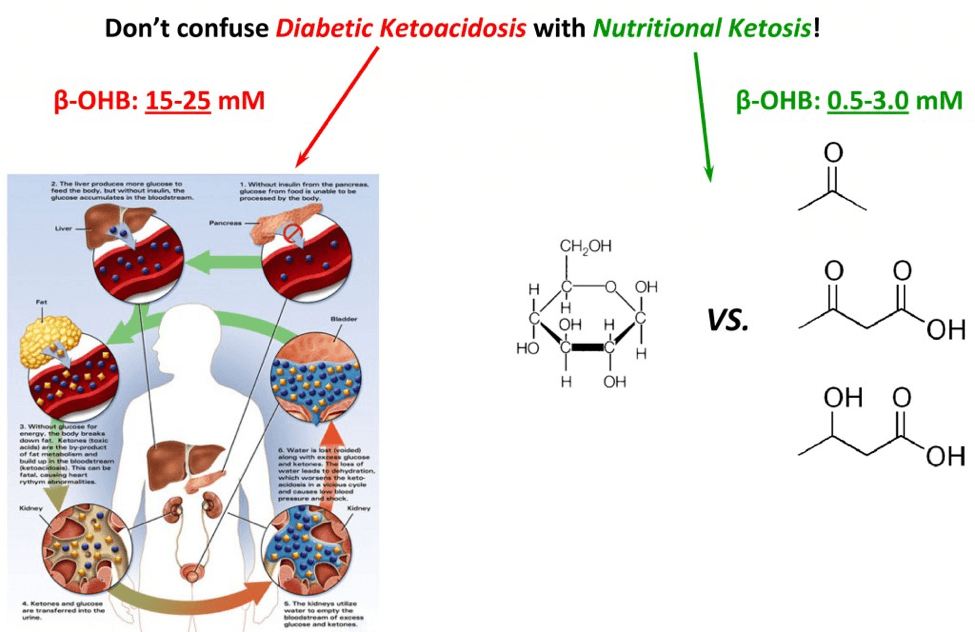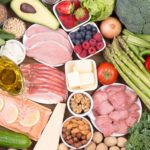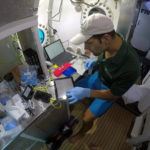You may have heard from your doctor that ketosis is a life-threatening condition. If so, your doctor is confusing diabetic ketoacidosis (DKA) with nutritional ketosis, or keto-adaptation.
First, some semantics. Our body can produce, from fat and some amino acids, three ketone bodies (a “ketone” refers to the chemical structure where oxygen is double-bonded to carbon sandwiched between at least 2 other carbons). These ketone bodies we produce are: acetone, acetoacetone, and beta-hydroxybutyrate (B-OHB). [For anyone who is interested, they are the 3 most right structures on the figure, below.]
Why do we make ketones? For starters, it’s a vital evolutionary advantage. Our brain can only function with glucose and ketones. Since we can’t store more than about 24 hours’ worth of glucose, we would all die of hypoglycemia if ever forced to fast for more than a day. Fortunately, our liver can take fat and select amino acids (the building blocks of proteins) and turn them into ketones, first and foremost to feed our brains. Hence, our body’s ability to produce ketones is required for basic survival.
What is diabetic ketoacidosis? When diabetics (usually Type I diabetics, but sometimes this occurs in very late-stage, insulin-dependent, Type II diabetics) fail to receive enough insulin, they go into an effective state of starvation. While they may have all the glucose in the world in their bloodstream, without insulin, they can’t get any into their cells. Hence, they are effectively going into starvation. The body does what it would do in anyone – it starts to make ketones out of fat and proteins. Here’s the problem: the diabetic patient in this case can’t produce any insulin, so there is no feedback loop and they continue to produce more and more ketones without stopping. By the time ketone levels (specifically, beta-hydroxybutyrate) approach 15 to 25 mM, the resulting pH imbalance leads to profound metabolic derangement and the patient is critically ill.
But this state of metabolic derangement is not actually possible in a person who can produce insulin, even in small amounts. The reason is that a feedback loop prevents the ketone level from getting high enough to cause the change in pH that leads to the cascade of bad problems. A person who is said to be “keto-adapted,” or in a state of nutritional ketosis, generally has beta-hydroxybutyrate levels between about 0.5 and 3.0 mM. This is far less than the levels required to cause harm through acid-base abnormalities.
Keto-adaption is a state, achieved through significant reduction of carbohydrate intake (typically to less than 50 grams per day) and moderate protein, where the body changes from relying on glycogen as its main source of energy to relying on fat. Specifically, the brain shifts from being primarily dependent on glucose, to being primarily dependent on beta-hydroxybutyrate. This has nothing to do with what a diabetic patient is experiencing in DKA, but does illustrate how poorly informed and quick to react the medical community is. DKA and nutritional ketosis (or keto-adaptation) have as much in common as a house fire and a fireplace.
Photo by Andrew Yardley on Unsplash








While glycogen stores can be depleted within 24 hours as you say, the brain still needs glucose and we make it from smaller molecules through gluconeogenesis.
I am SOOO glad to have found you. I am a type 2 diabetic (67 years old) and have been trying to get in charge of my health for years. I follow a basically vegetarian diet, get plenty of exercise (swimming, weight room, walking my dogs, and occasionally biking), and work with a diabetic dietitian, acupuncturist, therapist, as well as an MD (OD). I have problems with balance and intestinal problems that I have been trying to get in control for years. I am now looking at a possibility of “Normal Balance Hydrocephalus” and considering treatment for that. It just seems to go on and on. I usually get up early in the morning and start researching medical information on the computer. Loved that video you did about the fat diabetic who had an amputation. BTW, I lost 35 pounds at the beginning of 2012 (without trying) and have been trying to gain weight since then. I am not at all fat, but can identify with that woman and with you having to do an amputation. Life just isn’t fair, is it?
HI Peter,
Thank you so much for all your hard work and dedication.
I started the Ketogenic diet 10 days ago and I feel fantastic – for the most part very joyous, clear headed, and even-kiel. The only negative thing troublesome is that I am having these bouts of intense anxiety, and my face and hands start to get really tingly, almost as if they are going numb.
Is this a normal part of keto-adaptation? It may be occurring around 3-4 hours after exercise, if I am in a stressful situation. Do you think it’s just my blood sugar dropping too low? Will this stop happening when I am fully adapted.
Thank you so much for your time and energy. You are a hero of mine!
Peter
Hard to say, other than perhaps hypokalemia and/or hypoMg. Supplementing sodium and Mg may address.
Hey Peter,
This is Peter again.
I’m guessing that the symptoms of tingling face and hands as well as anxiety are to do with hypoglycemia?
Or could it be too many ketones (maybe the exercise makes my ketones soar 4-5 hours later?)
Does stress cause a hypoglycemic response?
Or maybe I just have TOO much energy, and it leads to anxiety?
It’s just strange because I am otherwise very healthy – normal body weight, athletic
I love everything about the diet, except for these bouts of anxiety. I’m hoping this is just part of the keto-adaption process!!!
If so, how long does it take to fully adjust?
Thank you so much for your time brother!
hi,i wonder can anyone give me information on whether its safe to go into ketosis with no gallbladder ?
Hi Dr. Attia, I have a friend who is overweight and I put her on a HF/LC diet with 30 minute walking everyday. She has lost about 4 kgs into week 4. However, she recently broke out with a bad rash. It is even painful. I have read that this can happen when a person who is overweight begins to burn fat for energy. I have never had this happen to me, maybe because I was never overweight. I have been on a ketogenic diet for over 2 years. Have you heard of the keto/rash? Anything she can do to relieve the rash but remain in ketosis?
I think I’ve heard one other person mention this. Was transient, if I recall.
I get a rash when I over do protein. A result of excessive nitrogen release I believe. Up the fat intake and it goes away.
My observation is that when I was under 30 or so years of age, I could eat virtually anything and everything and not gain an ounce. Once I reached 30-35 years of age, I started to become aware that overindulgence would lead to weight gain, though still not being too difficult to control by portion management. Around 40, it didn’t matter what portions I ate. If I ate the RDA style diet and didn’t exercise feverishly, I gained weight. I then began to experiment with the Atkins diet and within 6 weeks lost 35 lbs. I am now 53 years old and immediately start to gain weight if a stray fro more than a week or so from the low carb diet. Despite the diet, and probably because I have orthopedic issues (right total hip, left total knee, and c4-5 cervical fusion – generally rampant osteoarthritis) my activity level is diminished and I continue to be unable to lose all the abdominal fat. Any suggestions?
Really hard to know Brian, without some detective work. Consistency of dietary intervention is probably most critical, once you identify which eating strategy works best, which it sounds like you’ve got a handle on.
PS:
One of my best friends is an anesthesiologist who continues to hold contempt for the ASA3’s of the world, especially if they are obese smokers. I wish he could come to realize, as you did, that the problem is far more complex and that most people wish they didn’t have the problems they do.
Hi Dr. Attia,
First, I would like to thank you so much for your blog and for taking the time to respond to so many questions. I like reading your posts .
I weight train 6 days a week and 1 or 2 days of cardio ( 10K run ) . Just started changing my diet currently i eat 50 to 100 grams of carb 100 to 150 grams of protein and 100 to 150 grams of fat and once a week carb up ( height 5ft10in. weight 73kg ) . i started improving my cardio from this diet and did not loose any strength and also gained some muscle while loosing fat , this diet works great but i wanted to ask you is there any changes i can do. Also i wanted to ask how long will it take to become a fat burning machine . And what will happen if i consume too much fat with very less protein and carb like more than 5000 calorie will i gain weight .
I’m not sure what a ‘fat burning machine’ is, but within a few weeks to months of dietary change, RQ will fall, which implies greater access to FFA. It can take longer, for reasons I alluded to in another post, to fully adapt at the mitochondrial level, though. Your other question is addressed in the post on fat flux.
Hello Peter,
I am trying this diet lately, I am in my forth week now. I am not in ketosis yet, I still need to find my way, I am working on it.
I am diabetic type 1 and I need to know if there is any way to get high ketosis whilst have normal blood sugar levels (70-115). It would be enough for me just to check my BG and inject insulin when necessary, or do I still need to check ketones as well?
I know what ketosis acidosis means I have been through one when I was diagnosed but still a bit confused how this works. I have read a lot on your blog which is awesome!!
Mihail, as a T1D you really need to be consulting with a physician in person (not over the internet) who can help you. You may also want to start by reading Richard Bernstein’s book. Dr. Bernstein is himself a T1D.
Hi Peter,
I’ve read the book already as you adviced me few weeks ago.But in the boook there isn’t any word about ketosis. He keeps talking about low carb, recepies examples and what a marvel this diet is. Your blog says away more interesting and detailed stuff.
About the doctors they don t have a clue what I am talking about. They say ketosis is dangerous. And when I ask them why, they cannot explain. Until I ll find a good doctor I was hoping you can help me with regards thia ketons and normal blood sugar. I really wnt to try this diet.
Thank you for what are yoy doing with your blog and NuSi. On this planet we need people like you.
Dr. Attia,
Thank you so much for defining scientifically what this diet does for your body. I am 34 yrs( Former High School Science teacher) old and just realized a few months ago that I have been “sick” my entire life. Ever since I was a little boy I was always in the doctors office for terrible stomach cramps, anxiety, ADD, chronic heart burn, body aches and pains, constant headaches, not to mention I was 50 lbs overweight and all the highs and lows that come from eating carbohydrates.
I have been L C HF for two months with one slip up( not my fault…I was served a non diet drink and was I shaky and sick twenty minutes after and for two days felt poorly).
ALL THE ABOVE AILMENTS ARE GONE!! No medicine has been able to do what this way of eating has. I want to stand on a mountain top and shout to the world how bad carbs are( for me). I have never felt better in my entire life. Really. So much so that if I didn’t lose another pound, heck even if I gained weight, I still would never eat another chocolate chip cookie again because of all the other benefits.
I thoroughly enjoy cooking and preparing my own food ( as well as my son’s) he’s not keto adapted. My diet consists of 70-80% fat, 15-20% protein and the rest carb in the form of leafy veggies.
.My “control” if you will, was feeling terrible all the time. I thought that’s just how people felt. Man I was wrong.
Total convert Here!! 238 lbs sept 1st to 209 lbs (and losing) November 1st.
Rick
Congratulations, Rick, and thank you for sharing the transformation.
Hi there.
Would appreciate a little advice, I am on a water fast (drinking two black coffees and peppermint teas as well predate) and on the third day I woke up really lightheaded, fatigued and quite drained. I felt so bad I had to eat a little bread and some eggs. Can this be the keytones making me feel so wretched? And if yes, is there anything I can do to lessen this?
Thank you!
What you attempted is not a fast. Water only is a proper fast. Doing it that way, the hunger ceases after several days. I’ve fasted regularly all of my life (I’m 80) and the long-lasting results have been miraculous. My longest fast was 30 days (I took a leave from my job) and I walked several miles daily.
It has its humorous side. When I was modeling, the photographer asked me whether I have a moveable tumor because I was always a different size for the shoot. During that era, I was fasting two days a week, losing 2 pounds every fasting day. Four pounds wasn’t that much to lose but it does alter dress size.
I now eat one meal daily after a 19-hour fast; I am able to do an intense weight-resistance workout daily (well, six days a week). Having been born with genetic heart disease, being highly functioning and not too bad looking at this age makes me feel like Wonder Woman.
Now THAT is fasting!
From writing that you ate bread I assume that you weren’t eating low carb before the water fast. A water fast for someone not in ketosis starts with a minimum of 3 days of increasing pain, sometimes more. It is also difficult for some people to water fast without a lot of sodium, magnesium and potassium supplements – you’ll feel weak and vague aches much later on as well. If you want to go into a water fast cold, maybe try taking MCT oil the first few days and supplement with electrolytes every day.
You’ll feel better if you switch to ketosis first and then water fast. After the weeks of adaptation, say the average of 6 weeks, you may be able to switch in and out of water fasting while remaining in ketosis and not having the withdrawal from glucose symptoms. But Dr. Attia writes here that the big nightly meal on intermittent fasting would knock him out of ketosis and made him feel uncomfortable, so it varies by person – you may still feel uncomfortable.
Hello my daughter has just been diagnosed with a Glioma brain tumour, her partner has her on the Ketogenic diet, is ketosis a bad thing and is she liable to get ketosis if so is that good or bad plz help me understand
Julie, I’m sorry to hear about your daughter. Ketosis is not a bad thing, but the question you’re obviously asking I don’t know the answer to (will it help your daughter?). I will be writing about this in the coming month or so, though.
Julie,
I have an interest in this topic too. I’m sure Dr. Attia’s upcoming article will be help answer your questions. In the mean time, I found this article to be helpful for me in understanding the interplay between cancer and ketosis. I hope it can be useful to you too.
https://www.cavemandoctor.com/2013/01/01/an-introduction-a-ketogenic-diet-for-cancer/
Bob
Hi Peter,
I’m sure you’ve addressed this question somewhere, but what is the impact of a ketogenic diet on bone health? Does it create an acid environment that leeches calcium and other minerals from the bones ?
Thanks
I have not seen this studies, but I recommend people do a 24 hour urine collection to look for calcium oxalate and such to determine if they need supplementation. NK does not create an acid environment like DKA.
So, something I’ve been wondering that I can’t seem to find on the internet anywhere is what is the normal range of ketones for someone on a ketogenic diet, meaning they go from no carbs to a few carbs. I asking because I might intake something with like 19 grams of carbs one day, and have nothing with carbs the next. And preferably in mg/dl. rather than mmol/L.
I look at my ketone urine strips. They are ReliOn ketone strips that I bought from the Wal-mart diabetes section, and my ketones increase rather rapidly when I cut my carbs out. Within three to four days of having next to no carbs or maybe a few, I was already between “small” and “moderate”, which is given the numbers 15mg/dl for small and 40 mg/dl for moderate.
Then next day, I ate half a dozen donuts in one setting from Dunkin Donuts because I just had that sweet tooth you get when you’re still working yourself into that ketogenic diet. Anyhow, several hours later, I tested my urine again, and it was between 5 and 15 trace and small. Since the donuts, I kept up with the ketogenic diet. and the next morning I was in between 15 and 40, small and moderate again. Then, later that day, I was around 40, moderate. Then the next morning, today, I’m between 40 and 80 Moderate and Large. So, I’m trying to figure out what the maximum safe levels of ketones are for me. I’m about 250lbs, but I can rapidly lose weight on this diet. I’ve struggled to do this diet for about 3 or 4 months now, and I’m finally at a point where I actually feel more energetic. It used to be I was feeling semi-run-down and somber, but now all of a sudden yesterday, I didn’t have any carbs at all, but for some reason, I was feeling rather energetic, more than I had in a long time. It reminisced of the days of when I was a kid. It made me wonder if my body was finally adapting to a low-carb diet. As it is now, I don’t crave sugar this morning. I don’t really crave anything. I ate a few pork rinds, and I seem to be mostly satisfied for now. Before, don’t usually crave anything in the mornings either, but I guess I’ll see how the day progresses. Anyhow, I’m re-hydrating to see how that affects my keytone levels.
I have been trying to follow a low carb (ketogenic diet) for approximately 5 weeks now. I am still very
addicted to carbs and I believe that I am in and out of ketosis, but I am not sure. When I check my
ketones with urine strips, I am at lower end of ketone production. Sometimes they show no ketone
production at all. I understand that checking the blood would be more accurate. I go to the gym almost
every day believing that if I exercise I can burn off some of the extra carbs that may have been stored
as glycogen as a result of my eating too many carbs. I try to stay as low as 20 carbs per day, but some days
I can go as high as 50 carbs. I have lost approximately 17 pounds in 5 weeks. I am a type 2 diabetic. Some days I don’t feel too well, but I can’t tell if it is the diabetes, the high blood pressure or the diet. My triglycerides are normal. Am I doing the right thing?
I have PD and have been eating 12 TBS CO daily. I seem to get swings in ketone levels. I start my day with a brisk walk which gives me a good level of ketones (PD symptoms fade) but when I start snacking my ketones drop. I think I need to consume low glycemic carbs, to sustain ketone levels. Can you suggest some foods that would help ?
I AM NOT ASKING NOR EXPECTING MEDICAL ADVICE __ You are released from that expectation and totally indemnified — Just would like more info on when ketosis will kick in and begin work on scar and tumor and other foreign tissue.
Please please help me — or forward to another doctor that might be able to answer my questions? A dr Lupo? I can’t find him — anyone else? all of your i indemnified by me — just looking for info on when ketosis begins — must I get rid of all adipose tissue first? Please help.
Please help — I’m in day 35 of a 40-60 day water only fast — purpose to use ketosis to burn out a kidney tumor – already been thru the warnings from Veterans doctors who freely say they have only had a single course in nutrition (some time ago) and have been warned by them that electrolytes can affect my heart — avoiding all glycerine, glucose, glycerol and anything but water — still have adipose tissue and am simply wondering when in the process, ketosis will begin to digest kidney tumor? Doctors want to cut and rip and take out kidney because “After all you have 2 and only need 1” mentality. Ketosis strips show high ketones between 80 and 160 — but as I say adipose tissue still present. Have cat scans will be happy to send you if yu want them — doctor will do another cat scan when i finish fast — attempting a complete fast till hunger returns — but I am hopeful that body will have digested tumor long before that tie. Can you advise as the when that work may start?
I survived a subdural hematoma this time last year and amazed my doctor (apparently only 22 out of a 100 do so) and when burr hole was opened fluid squirted two feet across operating room (doctor said in 2000 operations he’d never seen that) and then my brain which was supposed to take up to a week or so to expand reexpanded in less than 30 minutes — so I have a remarkable gift of the Lord Jesus in my particular immune system. I am counting on the complete fast to consume scar tissue left over and perhaps even help heal my vision– VA doctor has me down for more blood tests next week to make sure of electrolytes — but has grudgingly accepted that I’m doing this no matter what. Tumor was somewhere around 2.2cm in middle of right kidney — applying my faith and fasting to consume it — have already surprised oncologist with fact that it had not shown signs of growth – (one doctor said of the other ‘He was amazed you had not yet had to pick out a coffin’) . I really want to finish this ast and believe ketosis will help cure. Still on water only — hunger is gone (I coo almost daily for my wife and do not cheat ) but I can find nothing on web about when ketosis may begin work on scar tissue and tumors. Must all adipose tissue be gone first? Can you help? Again will send catscans if you wish — but haven’t had one since I began fast over 30 days ago — prepared to go to sixty days if necessary or until hunger returns. I AM NOT ASKING NOR EXPECTING MEDICAL ADVICE __ You are released from that expectation and totally indemnified — Just would like more info on when ketosis will kick in and begin work on scar and tumor and other foreign tissue. Current weight at 180 down from 260 but much of that is water weight — have fasted before but this is longest so far — have been advised that quitting and starting again could allow tumor to rebound and metastasize.. Believe God will help me make sure that doesn’t happen – so just looking for your opinion or info on the matre — not your medical advice that could freak out other doctors.
Sincerely — Roy Pearcey
If it was me I would add charcoal to absorb some toxins possibly released during this extraordinary fast. Instead of just breaking the fast when you do later, I would switch to a high fat moderate protein green vegetables and zero bread strong starches – diet after, to keep blood sugar and IGF-1 low hereby giving slim chances for tumor to rebound. I would also take some sea salt with the water but your doctor is apparently checking electrolytes and making additions as required.
The follow on high fat diet ( start slowly ! build up over maybe 2 weeks ! ) could help clearing toxins from the liver, again with charcoal support to avoid recirculation. Add magnesium then to avoid hard slow moving stools.
I am no doctor. It’s just my 5 cents.
It’s all yours and the best of luck!
Hi, I am a mother of 2 boys one of them is diabetic type 1 ,, today i checked BG and Ketone of my second child who is not diabetic and his BG= 4.7 and his Ketone=0.4 …do I have to be worried for my son or no ,,,, Thanks so much
DKA does not occur until BHB levels get in the range of 15 to 20 mM. This only occurs in people with T1D or very late stage T2D.